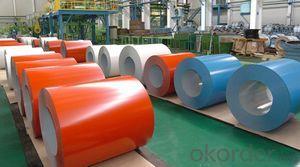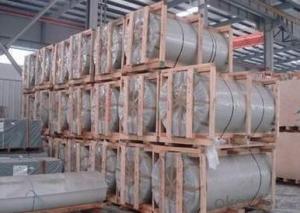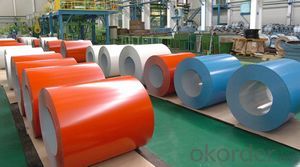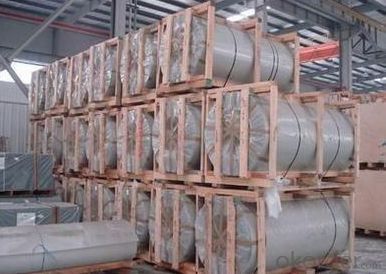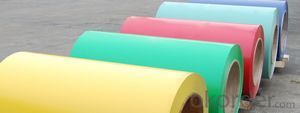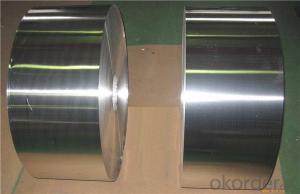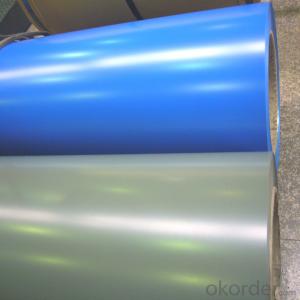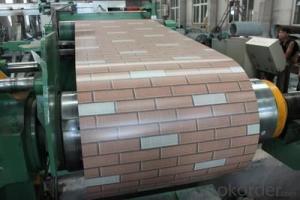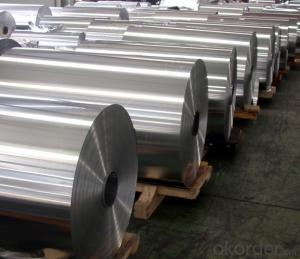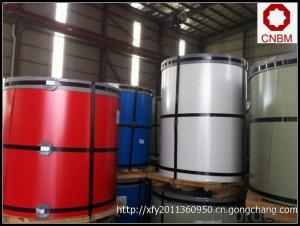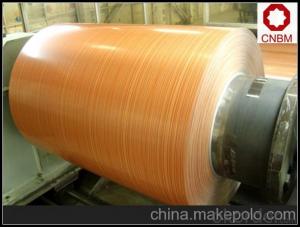Ruud AA 3105 Coated Aluminum Coils
- Loading Port:
- China Main Port
- Payment Terms:
- TT OR LC
- Min Order Qty:
- -
- Supply Capability:
- -
OKorder Service Pledge
Quality Product, Order Online Tracking, Timely Delivery
OKorder Financial Service
Credit Rating, Credit Services, Credit Purchasing
You Might Also Like
supply Mill-finished / coated aluminum plate/sheet/ coil:
Alloy: AA1050,1060,1100,1200,2024,3003,3304,3005,3015,5052,5086,5754,5083,6061,7050,7475,8011, etc
Temper: O, H14/16/18/22/24/32/ H112/H321/T6,T851,T7451,T7351, etc
Thickness: 0.02mm—20mm
Width: 100mm—2000mm (Can be slitted)
Notice: PE coating / PVDF coating / Embossment can be done if required.
- Q: Can aluminum coils be used in food processing or packaging applications?
- Yes, aluminum coils can be used in food processing or packaging applications. Aluminum is a widely used material in the food industry due to its excellent properties such as corrosion resistance, light weight, and heat conductivity. It is commonly used for wrapping food, creating food containers, and in the form of coils for various food processing applications. Aluminum coils are often used for packaging perishable food items like meat, dairy products, and beverages. The coils can be easily formed into different shapes and sizes to meet specific packaging requirements. Aluminum's excellent barrier properties help protect the food from moisture, oxygen, and light, ensuring longer shelf life and maintaining food quality. In food processing, aluminum coils are utilized in various equipment such as heat exchangers, evaporators, condensers, and refrigeration systems. Aluminum's thermal conductivity allows for efficient heat transfer, making it suitable for applications that require precise temperature control. Furthermore, aluminum is non-toxic and does not react with food, making it a safe and hygienic choice for food processing and packaging. It is also recyclable, making it an environmentally friendly option. Overall, aluminum coils are widely accepted and used in food processing and packaging applications due to their versatility, durability, and suitability for maintaining the quality and safety of food products.
- Q: What are the common surface treatments for aluminum coils in the automotive industry?
- In the automotive industry, aluminum coils undergo various surface treatments to enhance their performance and appearance. Some common surface treatments for aluminum coils in the automotive industry include: 1. Anodizing: Anodizing is a popular surface treatment for aluminum coils as it creates a protective oxide layer on the surface. This process involves immersing the coils in an electrolytic solution and passing an electric current through it. Anodizing provides corrosion resistance, improves durability, and allows for the application of dyes or paints. 2. Painting: Aluminum coils can be painted to provide an aesthetically pleasing appearance and protection against environmental factors. The coils are coated with a layer of paint, which can be solvent-based or powder-coated. Painting not only enhances the visual appeal but also adds a layer of protection against scratches and UV radiation. 3. Cladding: Cladding involves bonding a layer of aluminum alloy with different properties onto the surface of the coil. This treatment is commonly used to improve the strength, thermal conductivity, or corrosion resistance of the aluminum coil. Cladding can be done through various methods, such as hot rolling, cold rolling, or explosive bonding. 4. Clear Coating: Clear coating is often applied to aluminum coils to provide a transparent protective layer. This coating helps prevent corrosion, oxidation, and discoloration, while also preserving the natural metallic appearance of the aluminum coil. 5. Polishing and Buffing: Polishing and buffing are surface treatments that aim to enhance the surface smoothness and shine of aluminum coils. These treatments involve mechanically grinding or polishing the surface to remove imperfections, scratches, and oxidation. Polishing and buffing are commonly used for decorative purposes in high-end automotive applications. These are just a few of the common surface treatments for aluminum coils in the automotive industry. The choice of treatment depends on factors such as the desired appearance, performance requirements, and environmental conditions the coils will be exposed to.
- Q: why is aluminum to the right side of the periodic table if it's a metal and why is it negatively charge if it's a mental. also if you combine it with like another metal will it be an ion since its positively charge or no because they are both metals
- Aluminum is not placed with the other metals such as transition metals or alkali metals because it is classified as a poor metal. Elemental aluminum, in it's pure form, is not an ion because it has no charge. If combined with another metal, the result will also be neutral if the metal aluminum was being combined with was neutral. Hydrogen won't have the same case because it is not a metal, it is a gas. The only reason it is in the same column as metals is because they all have 1 valence electron
- Q: How do aluminum coils perform in cryogenic environments?
- Aluminum coils generally perform well in cryogenic environments due to their low thermal expansion coefficient and high thermal conductivity. When exposed to extremely low temperatures, aluminum coils exhibit minimal contraction and expansion, making them suitable for use in cryogenic applications. The low thermal expansion coefficient ensures that the coils maintain their structural integrity and do not deform or crack under extreme temperature fluctuations. Additionally, aluminum's high thermal conductivity allows for efficient heat transfer, enabling the coils to dissipate excess heat and maintain a stable temperature within the cryogenic environment. Overall, aluminum coils are a reliable choice for use in cryogenic environments and can effectively withstand the challenges posed by extremely low temperatures.
- Q: This question asks about the impact of aluminum coils on the quality of food when it is stored. It seeks to understand if there are any changes in the food's properties due to the presence of aluminum coils.
- <p>Aluminum coils themselves do not directly affect the quality of food during storage. They are often used in the packaging industry for their excellent barrier properties against light, oxygen, and moisture, which can help preserve the freshness and quality of food by preventing spoilage and oxidation. However, it's important to note that aluminum does not interact with food in a way that alters its taste or nutritional content. Any potential health concerns related to aluminum exposure are more associated with the manufacturing process and not with the storage of food in aluminum-coiled packaging.</p>
- Q: Aluminum roll width 750mm, single layer thickness 6.5mm, diameter 400mm., how to calculate the weight of the aluminum roll?
- You can use the outside diameter, the inner diameter and the width to get the volume. You know the density and volume, and then you can find the weight naturally
- Q: How do aluminum coils compare to copper coils in terms of conductivity?
- Aluminum coils have lower conductivity compared to copper coils.
- Q: Are aluminum coils recyclable?
- Yes, aluminum coils are recyclable. Aluminum is a highly recyclable material, and it can be melted down and reused to make new products, including coils. Recycling aluminum helps conserve natural resources and reduce energy consumption.
- Q: Can aluminum coils be used in electrical wiring applications?
- Indeed, aluminum coils possess the capability to be employed in electrical wiring applications. For numerous years, aluminum has served as a conductor in electrical wiring, particularly in residential and commercial structures. As a lightweight and economical substitute for copper, it has been widely embraced. Aluminum coils find common usage in power distribution, transformers, and motors. Nevertheless, it is crucial to acknowledge that aluminum exhibits contrasting electrical and mechanical properties in comparison to copper. As a result, meticulous installation techniques and connectors exclusively crafted for aluminum wiring must be employed to guarantee both safety and efficiency.
- Q: i have recently received a task to research the recycling processes of aluminum ..... the task also asks to STATE ALL RELEVANT MATHEMATICAL OR/AND CHEMICAL EQUATIONS ...when i researched the task i found how aluminum is recycled, but i couldnt find the relevant equations ...can you please help meall answers are really appreciated
- Aluminium recycling is the process by which scrap aluminium can be reused in products after its initial production. The process involves simply re-melting the metal, which is far less expensive and energy intensive than creating new aluminium through the electrolysis of aluminium oxide (Al2O3), which must first be mined from bauxite ore and then refined using the Bayer process.
Send your message to us
Ruud AA 3105 Coated Aluminum Coils
- Loading Port:
- China Main Port
- Payment Terms:
- TT OR LC
- Min Order Qty:
- -
- Supply Capability:
- -
OKorder Service Pledge
Quality Product, Order Online Tracking, Timely Delivery
OKorder Financial Service
Credit Rating, Credit Services, Credit Purchasing
Similar products
Hot products
Hot Searches
Related keywords
